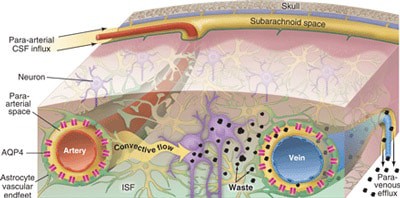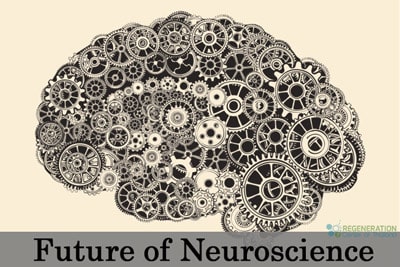Most classically trained medical professionals don’t really give our lymphatic systems a lot of though in making diagnoses for neurological disease. In fact, many patients can even have parts of their lymphatic system such as a spleen removed with little or no immediate side effects. Without our complex lymphatic system however, our circulatory system is incomplete. The fact is that most of our hematopoietic “blood” cells stay inside our vasculature but nearly around 5 gallons per day (20 liter) of plasma can pass/leak directly out of our capillary system and into the surrounding tissues. The lymphatic system is what collects the plasma and returns it.
A stunning new discovery has been made that shows that human brains are directly connected to our immune system by blood vessels that were previously not known to exist. Researchers at University of Virginia College of Medicine have found the missing link that had previously escaped detection my mapping our lymphatic system using imaging technologies that were not previously available. The significance of the link will have massive impact on the clinical studies and treatments of many neurological conditions ranging from Ataxia, Autism Spectrum, Spinal Muscular Atrophy Disease, Motor Neuron disease, Parkinson’s and Alzheimers.

Before this recent discovery, doctors have had to try to better understand the immunological response of brain diseases and not the underlying cause. Now doctors will be able to approach brain diseases pragmatically just like every other tissue and organ in our body. The connection of the brain and the peripheral immune system through our meningeal lymphatic vessels is a drastic paradigm change in how we should perceive a neuro-immune response and interaction.
Since our lymphatic system provides our immune cells a network throughout the body, the direct connection link to the brain will have immediate impact in the diagnosis and treatment for many neurological diseases. Previously, imaging has shown Immune cells in the brain, But until this discovery, their presence was assumed to be some structural defect or breach that was secondary to any infection or other brain damage Neurological diseases can now be looked at from a very direct approach to better understand and fight every neurological disease known to man. The immune component to the known neurological diseases presents a major shift in the understanding of the previously incurable neurological conditions.
New discovery will change All medical textbooks
A quick look at any anatomy website online will show no relationship or connection between the lymphatic channels to our brains because no person has ever found such a link, until now. Previous to this discovery, scientists believed the human body was completely mapped and that there was not a lymphatic system for the human central nervous system. Thanks to the findings, doctors will now have to fundamentally change the way they look at our central nervous system and it’s complex relationship with our lymphatic immune system. Such an approach has been discussed by many eastern/naturopathic medical experts however it was not taken seriously in the western medical system due to lack of evidence.
The initial discovery was made by Dr Antoine Louveau and his team and were recently published in the journal of nature. It explored the many fluid compartments of a brain by using two methods:
- Marking and labeling Antibodies on the molecular level to check the expressions of various cells in membranous linings of the dural sinuses
- Injecting dyes directly into the brain fluid compartments to see where in the body they would end up
Dr Louveau and his team tracked the cells through the cerebral lymphatic passages and into major sinuses that then collected and drained the blood from the brain. The areas have previously been “very well hidden” and known to be very difficult to image using standard MRI’s or CT Scans. The live imaging of the vessels using marked antibodies and dyes was critical in demonstrating the link between the brain and the function of lymphatic immune system.
The relationship between the brain & immune system
The relationship between the brain and the immune system has been a subject of increased interest and research in recent years. Scientists have discovered various ways the brain can regulate its immune responses. This includes sending molecular cues to immune cells in the skull bone marrow via the cerebrospinal fluid, highlighting a direct regulatory mechanism the brain employs to maintain immunological balance.
Further underscoring the intricate connections between these two systems, a significant discovery detailed the structural and functional features of central nervous system (CNS) lymphatic vessels. This finding provided a “missing link” in understanding how the brain and immune system interact, demonstrating that the CNS is not as isolated from the peripheral immune system as previously thought. Identifying these lymphatic vessels within the CNS has significant implications for understanding numerous diseases, showing a direct pathway for the immune system to influence brain function and vice versa.
These insights contribute to a broader understanding of the neuroimmune interface, revealing that the relationship between the brain and the immune system is complex and bidirectional. This relationship has profound implications for understanding and treating neurological disorders, indicating that the immune system can directly affect brain health and function and highlighting potential new avenues for therapeutic interventions.
A New Future for the Treatments of Neurological Diseases
A clear understanding of the collaboration of our brain and lymphatic system is crucial to recognize what is wrong and how we can repair it. For years, we have known that Alzheimer’s disease is primarily attributed to the plaque caused by rapid accumulation of large protein chunks in our brains. With this discovery, we can start investigating the root cause of why these proteins accumulated in the first place and why they were not being removed by these newly found vessels connecting our lymphatic system and brain.
Knowledge of these connections will help reduce the many uncertainties in treating brain diseases and how we can more effectively make minor alterations to the brain to help restore normal function that was lost due to neurodegenerative diseases and neuroinflammation that is caused by a dysfunctional immune system.

